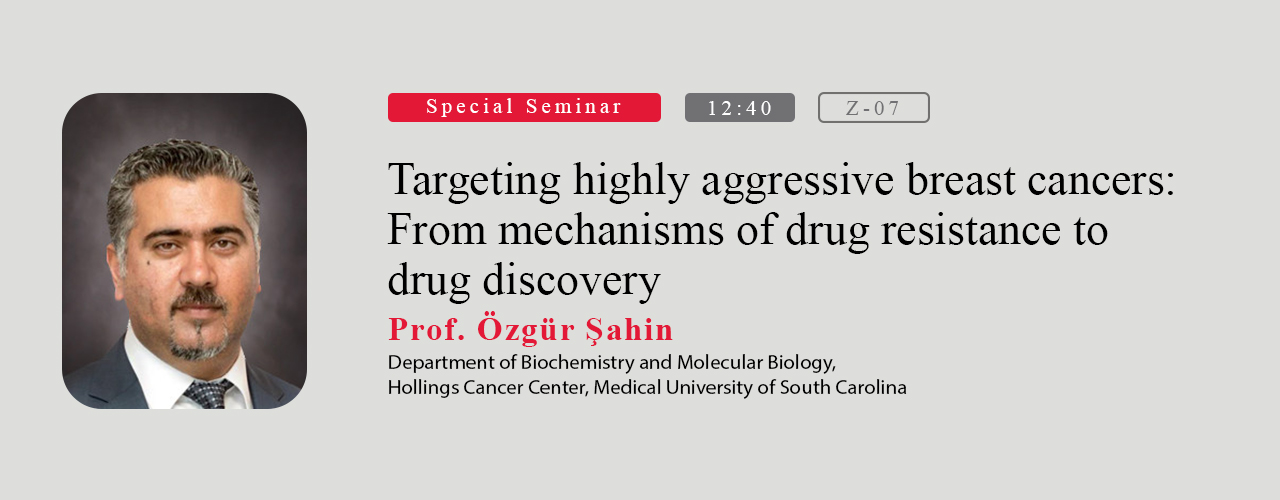Targeting highly aggressive breast cancers: From mechanisms of drug resistance to drug discovery
- English
- Türkçe
Seminar Title: Targeting highly aggressive breast cancers: From mechanisms of drug resistance to drug discovery
Location & Time: Z-07, 16/11/2022 at 12:40.
Özgür Şahin, Ph.D.
Professor and SmartState Endowed Chair
Department of Biochemistry and Molecular Biology, Hollings Cancer Center, Medical University of South Carolina, Charleston, SC, 29425, USA
Our laboratory focuses on identifying the mechanisms of drug resistance and targeting these resistance-driving factors with either by our own developed compounds or available molecules/drugs to overcome resistance. In this seminar, I will first talk about overcoming chemotherapy resistance in triple-negative breast cancer (TNBC), the most aggressive breast cancer subtype. We identified hypoxia-induced ECM re-modeler, lysyl oxidase (LOX), as a key inducer of chemoresistance, and we showed that inhibiting LOX overcomes chemoresistance. However, currently, available LOX inhibitors suffer from a lack of specificity and high toxicity. To identify more potent and selective LOX inhibitors, we performed a high-throughput screen (HTS) of a diversified small-molecule library and performed structure-activity relationship (SAR) analyses, and optimized our lead compound for more potent activity and better drug-like properties. In the second part of the seminar, I will talk about highly aggressive breast cancers with centrosome amplification (CA), which is a hallmark of cancer. We identified Transforming Acidic Coiled-Coil Containing Protein 3 (TACC3) to be overexpressed in tumors with CA, and its high expression is associated with dramatically worse clinical outcomes. We demonstrated that TACC3 forms distinct functional interactions in mitotic and non-mitotic cancer cells with CA to facilitate centrosome clustering (CC) and transcriptional repression of tumor suppressors, respectively. Targeting TACC3 by our TACC3 inhibitor (BO-264) or guide RNAs strongly inhibits the growth of organoids and breast cancer cell line- and patient-derived xenografts with CA. These studies led to a partnership with the pharma industry to develop BO-264 into a more drug-like molecule through ADME, PK, and other detailed studies, and it is currently completing IND-enabling studies for clinical trials in patients with highly aggressive cancers.
Short biography
Özgür Şahin is a Professor and SmartState Endowed Chair in the Department of Biochemistry & Molecular Biology and Co-leader of the breast transdisciplinary cancer team at Hollings Cancer Center at Medical University of South Carolina (MUSC), Charleston, SC. He earned his B.Sc. degree (high honor) in Molecular Biology and Genetics from Middle East Technical University (METU) in 2003, his M.Sc. from the University of Heidelberg in 2005, and his Ph.D. degree (summa cum laude) in cancer systems biology/cell biology at German Cancer Research Center (DKFZ) and the University of Heidelberg in 2008. Previously, he held positions as a research team leader in the Division of Molecular Genome Analysis at DKFZ, as a research faculty in the Department of Molecular & Cellular Oncology at the University of Texas MD Anderson Cancer Center (MDACC), as an assistant professor in the Department of Molecular Biology & Genetics at Bilkent University and as an associate professor in the Department of Drug Discovery & Biomedical Sciences at University of South Carolina (USC). Dr. Sahin published more than 60 peer-reviewed papers in the field of cancer research in high-impact international journals (e.g., PNAS, Cancer Cell, Nature Communications, Cell Research, Molecular Systems Biology, Clinical Cancer Research, and Oncogene, etc.) and filed multiple patent applications. To date, he has received multiple funding as PI for his research from the National Institutes of Health (both NCI and NIGMS), American Cancer Society, Mary Kay Foundation, European Molecular Biology Organization (EMBO), European Union FP7 Marie Curie Program, and industry. He obtained numerous awards, including Presidential Coin for Research Excellence from USC, TUSEB Aziz Sancar Science Incentive Award, TUBA Outstanding Young Scientist (GEBIP) Award, etc. Dr. Sahin is also the co-founder and manager of OncoCube Therapeutics LLC and the founder and president of LoxiGen, Inc.

